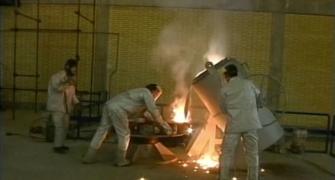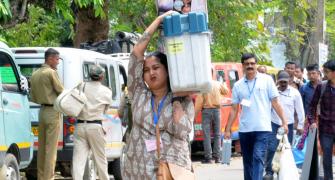Kerala is a creation of the rains; its tropical abundance obviously depends on lentiful monsoons. On a drive up the Kerala coast, there are areas of great beauty: the lakes around Paravur and Kollam, the river delta at Neendakara, the coast at Ambalapuzha immortalised by Thakazhi in Chemmeen, the road-and-rail bridge at Cochin, the Mayyazhi river, made famous by M Mukundan.
It is hard to believe this water-land faces shortages. Yet, this year's southwest monsoon seem to be failing: it is late and weak and this is cause for concern not only for Kerala, but also for the country as a whole, as GDP growth depends greatly on the rains.
Kerala is profligate and unmindful of its water resources, and cultural and political changes are making serious water deficiencies quite likely. Nowhere is this more evident than in the drying-up of the River Nila (renamed, un-euphoniously, as the Bharatapuzha). This is the biggest of Kerala's many rivers and streams that run westward from the hills to the sea. What used to be a perennial river is now reduced to a trickle much of the time, reminding one of the sad, dry, sandy riverbeds in other parts of India less blessed by the weather gods.
On the one hand, there has been severe habitat destruction, because much of the highland area has been deforested. There has been large-scale and methodical encroachment of the evergreen tropical forests especially in central Kerala. They cut down the non-renewable shola forests and replaced them with plantation crops. The result has been a dramatic reduction in rainfall, as well as topsoil runoff, just as it happened in the Khasi Hills of Meghalaya around storied Cherrapunji after religious conversions there.
On the other hand, as demand for residential construction has soared, so has the value of fine riparian sand. Massive; illegal sand mining has decimated riverbeds. The removal of sand seems to cause eddies to form in unpredictable ways, and the net effect seems to be a faster flow to the sea and less renewal of the water-table.
Add to this industrial pollution especially in the belt around Cochin, which makes the Periyar one of the more polluted waterways in the country. Kerala's rivers are dying.
Cultural and political changes have contributed greatly to the deterioration. Once upon a time, there were inland waterways that went all the way from Trivandrum to Cochin and beyond: flat-bottomed cargo barges transported all manners of goods. But due to lack of repair, the canals have filled up; for example, in Chackai, it is now a stinking, stagnant water body: pathetic. Everyone is far more enthusiastic -- surely because of opportunities for graft -- about a chimerical road superhighway, which is impossible to build in the densely-populated and agitation-prone state.
There was a time when every house in a village had a pond, and there were other water-bodies aplenty all around. In addition, there were working paddy fields, which act as sponges to retain rainwater, all over the place. When I was a child in Trivandrum, if you walked half a mile from anywhere in town, you would reach paddy fields or large public ponds. But this is no longer the case, for a variety of reasons.
Leftist-mandated minimum wages pay agricultural laborers the highest real incomes in the country, as well as other perquisites like pensions. While this was intended to improve the lot of the labourer, in effect it has led to the exact opposite, as loss-making paddy cultivation has been virtually abandoned in the state. It is saddening to see acres and acres of paddy fields lie fallow all the way to the horizon. They are deliberately left fallow for a while and then filled in and turned into residential land.
This has been disastrous for the water-table, at the very time that demand for water has swelled because of higher-density housing. Household wells have had to be deepened, and bore-wells have made their appearance (unheard of in the past). Alarmingly, there have been reports of the spectacle of wells 'disappearing': they suddenly fill up with soil. This is a sinkhole phenomenon caused by the disappearance of underground aquifers.
Government response to these abuses has been abysmal. An apt metaphor is a large pond in the Muttada area of Trivandrum, which I used to admire when I was a child. This, a reservoir and catchment area, has been completely filled in and a five-storey building constructed over it. The building houses the 'Groundwater Conservation Authority'! Talk of irony! Good sense, as always, takes a beating when the mandarins are involved.
On top of all this is the controversy over Coca-Cola's now-shuttered plant in Palakkad. This has allegedly depleted groundwater levels and dumped toxic sludge on local farmers as 'fertiliser', and its products are so full of pesticide that the US Food and Drug Administration refused to admit shipments from India! In addition, I am told Pepsi-Cola also has a (functioning) bottling plant in relatively dry Palakkad district. Interestingly, a one-man NGO, the India Resource Centre, has made so much noise, and made Coca-Cola's life so miserable, that this person, Amit Srivastava, got a front-page story in the Wall Street Journal.
Finally, Kerala's famed backwaters and canals are being denuded of fish and aquatic plant life by the pernicious weed called the water hyacinth, which forms an impenetrable barrier that chokes off oxygen to whatever is beneath. It is an example of a foreign species wreaking havoc on native flora and fauna: it was introduced as an ornamental plant by somebody. Despite many attempts that fattened the wallets of various people, the authorities still have no answer to this noxious menace.
Unless rainwater harvesting is enforced, and strict regulatory control enforced, water-rich Kerala is soon going to be water-deficient.
Postscript:
In memoriam: Anne Bancroft whose performance as the seductive Mrs Robinson in The Graduate was unforgettable. So was Dustin Hoffman, as the all-too-willing-to-be-seduced title character. And the brilliant sound-track from Simon and Garfunkel remains fresh after all these years. God bless you, please, Mrs Robinson, heaven holds a place for those who pray.
Another toast to Deep Throat who was come out of hiding after all these years. It is a tribute to the American system that a whistle-blower who actually brought down a President was not tracked down and murdered. Alas, in most countries, he would have been.
Comments welcome at my blog http://rajeev2004.blogspot.com







